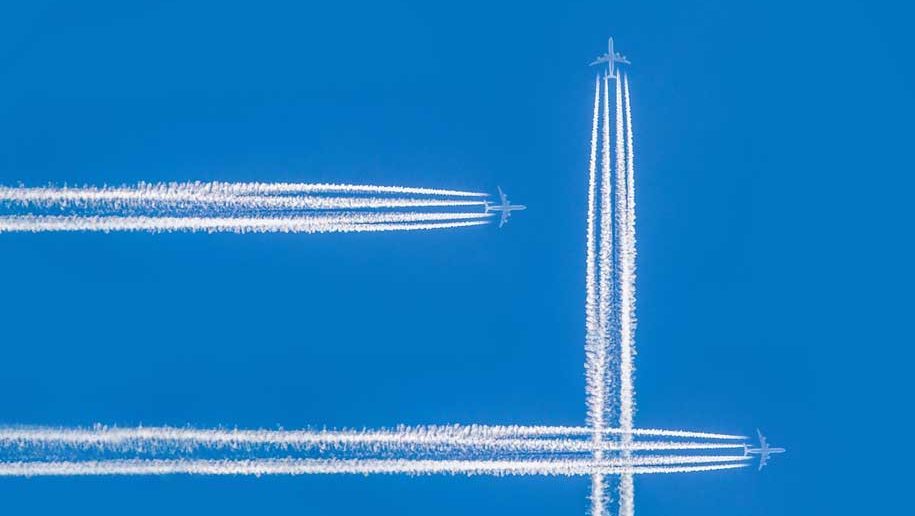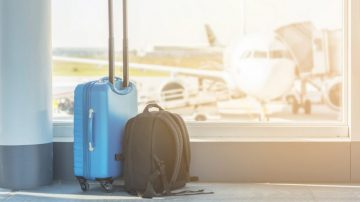
Will air travel ever get back to normal, and should it? Perhaps now is the best time to take stock of its environmental impact.
Of the many industries hit by the Covid-19 pandemic, aviation has taken a particularly big knock. At the height of lockdown in April, flights were down by 94 per cent across the world compared with April 2019. Thousands of airline jobs have been lost, huge bailouts have been granted by governments and low demand will persist for some time as travel restrictions and social distancing combine with passengers’ reluctance to board planes and get cosy with strangers. We might wonder when air travel will get back to normal. But given that the impending climate emergency has not gone away, perhaps the better question is whether it should it get back to normal at all.
Fuel to the fire
First, back to basics. The lifeblood of aviation and the main source of its pollution is kerosene, a fossil fuel. Burning one tonne of kerosene creates about three tonnes of carbon dioxide. Burn 359 billion litres, as the aviation industry did in 2018, and you create about 900 million tonnes of CO2 – more than Germany’s entire economy.
The other thing to know about kerosene is that it is untaxed for international flights. This tax exemption is a quirk of the so-called “Chicago convention”, signed in the late 1940s between world leaders drawing up rules for aviation that still apply today. It is kerosene’s tax-free status that has given aviation a competitive advantage over ferries, night trains or high-speed rail, enabled budget air travel, and is what makes it financially unattractive for the industry to invest big in alternative fuels.
So aviation is, at its core, a fossil fuel business, and a growing one. Pre-Covid, industry body IATA predicted a doubling of 2018 passenger numbers by 2038, meaning far more greenhouse gas emissions. By 2050, the industry is set to account for almost a quarter of all emissions globally, and be the UK’s single most polluting sector.
Without some meaningful changes in behaviour and policy, Covid might delay, but not stop, this trend. Aviation recovered quickly from slumps following 9/11 and the financial crash of 2008. It could easily do the same after Covid, especially if aviation continues to enjoy its privileged position as a low-tax industry.
This tax exemption often seems like a sacred cow of aviation, but how long can it last? When governments seek to repay eye-watering debts incurred in this crisis, through austerity measures or tax rises, aviation’s privileged tax regime may seem like an unfair historical anomaly. After all, you pay significant tax on a litre of car fuel, or a pint, but none on jet fuel. After the industry has got back on its feet, we’ll need to talk about tax.
Taxing fuel more could lead to two positive outcomes. First, if set at an appropriate level, it would reduce demand so that some less “essential” flights simply don’t take off. The industry would no doubt respond to this, so a second outcome would be a step-change in research and the scaling-up of cleaner alternatives to kerosene, especially synthetic “electrofuels”, which currently can’t compete with untaxed kerosene.
Airlines and airports would rather discuss alternatives such as carbon offsets, more efficient planes and routing, and future unproven technological breakthroughs. But given the limited time remaining to avoid climate breakdown, we need to get more radical. How to implement this? A “flat” carbon or fuel tax on flights would be the simplest to roll out, but a more targeted tax would be fairer. So the idea of a Frequent Flyer Levy (FFL) is gaining traction as a way to ensure access to flying is shared more equitably. A FFL would mean everyone gets one return flight tax-free per year, but subsequent ones are taxed at an escalating rate. So if you were to fly 20 times a year, it would cost an order of magnitude more than today.
Are we ready for the end of cheap flights? Perhaps lockdown has given us a practice run at a future with more Zoom calls and less flying. Some surveys also suggest Covid has increased concern over climate change. Maybe now is the time to start seeing flying as a luxury and taxing it as such, until we have really figured out a cleaner way of doing it. More details on the FFL can be found at afreeride.org
Dr Roger Tyers – Visiting fellow in sociology at the University of Southampton












